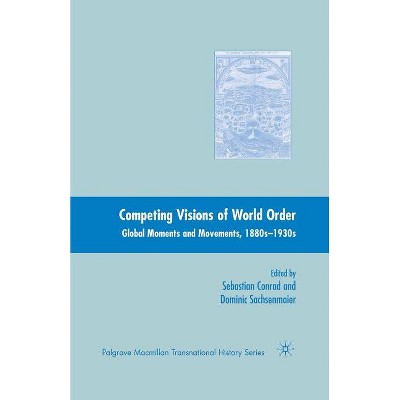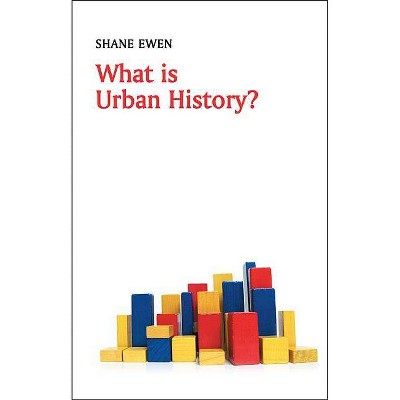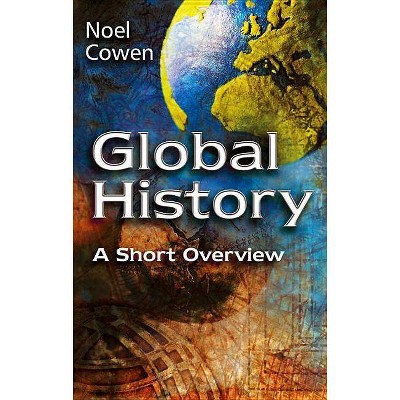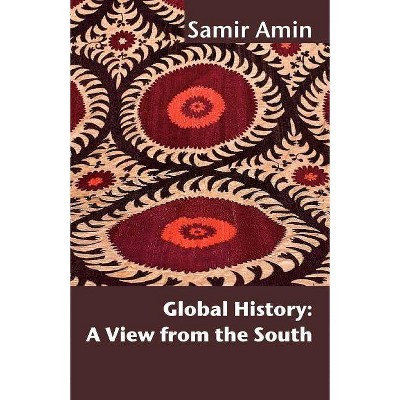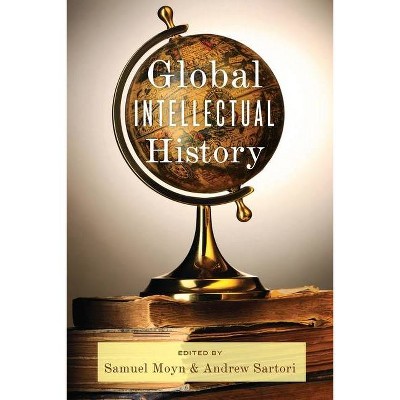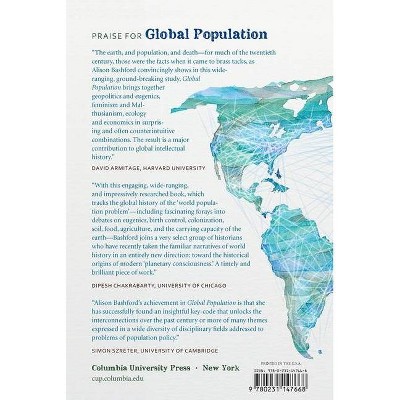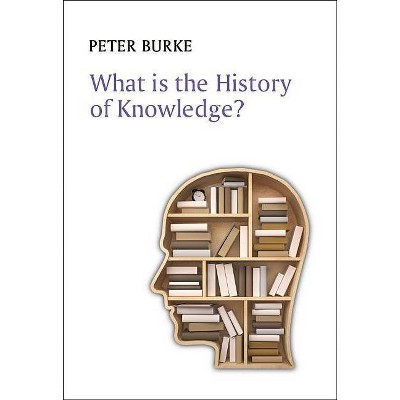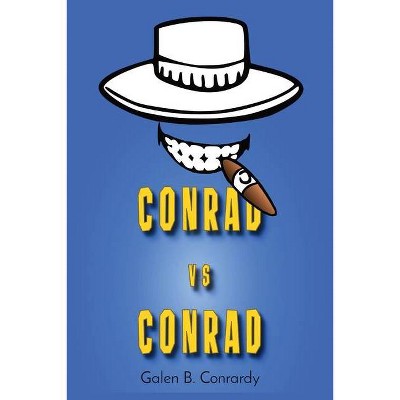What Is Global History? - by Sebastian Conrad (Paperback)
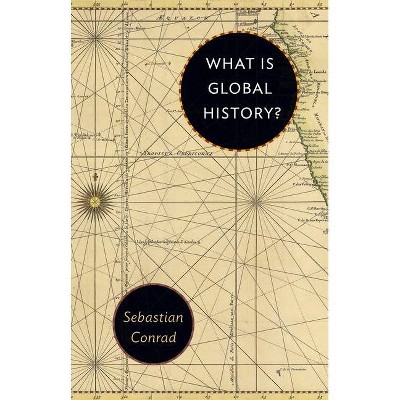
Similar Products
Products of same category from the store
AllProduct info
<p/><br></br><p><b> Book Synopsis </b></p></br></br><p><b>The first comprehensive overview of the innovative new discipline of global history</b> <p/>Until very recently, historians have looked at the past with the tools of the nineteenth century. But globalization has fundamentally altered our ways of knowing, and it is no longer possible to study nations in isolation or to understand world history as emanating from the West. This book reveals why the discipline of global history has emerged as the most dynamic and innovative field in history--one that takes the connectedness of the world as its point of departure, and that poses a fundamental challenge to the premises and methods of history as we know it. <p/><i>What Is Global History?</i> provides a comprehensive overview of this exciting new approach to history. The book addresses some of the biggest questions the discipline will face in the twenty-first century: How does global history differ from other interpretations of world history? How do we write a global history that is not Eurocentric yet does not fall into the trap of creating new centrisms? How can historians compare different societies and establish compatibility across space? What are the politics of global history? This in-depth and accessible book also explores the limits of the new paradigm and even its dangers, the question of whom global history should be written for, and much more. <p/>Written by a leading expert in the field, <i>What Is Global History?</i> shows how, by understanding the world's past as an integrated whole, historians can remap the terrain of their discipline for our globalized present.</p><p/><br></br><p><b> From the Back Cover </b></p></br></br><p>"<i>What Is Global History?</i> is an important assessment of one of the most profound historiographical developments during the past few decades. It provides a timely introduction for newcomers, and fresh and fascinating perspectives to scholars already active in the field."<b>--Dominic Sachsenmaier, author of <i>Global Perspectives on Global History</i></b></p><p>"Conrad has written a lucid and cogent book on the emergent field of global history. He clarifies the differences between this field and world history, globalization, and big history, as well as the related but different approaches such as postcolonialism and world systems. It will go far to introduce systematicity and method in explorations that seek to grasp the complex historical relations between the local and the global."<b>--Prasenjit Duara, author of <i>The Crisis of Global Modernity: Asian Traditions and a Sustainable Future</i></b></p><p>"<i>What Is Global History?</i> is a remarkable feat. With admirable grace and concision, it takes stock of the meteoric rise of global history in the Americas, Europe, and Asia during the past two or three decades. At the same time, Sebastian Conrad is a systematic thinker and a theorist in his own right, identifying methodological problems of global history and suggesting his own well-considered solutions. No other book succeeds better in mapping the field and charting its future."<b>--Jürgen Osterhammel, author of <i>The Transformation of the World: A Global History of the Nineteenth Century</i></b></p><p>"Calmly and incisively, Sebastian Conrad explains that when exciting new vistas beckon, our first task is not to plunge ahead unthinkingly, and this has never been truer than with the spectacular advent of global history in our time. Sketching a map of the territory, our masterful guide advocates an integrative approach to traversing it, concluding with a balanced consideration of whether global history is as cosmopolitan in spirit as its supporters believe. <i>What Is Global History?</i> is the best available and most accessible reflection on a much-discussed revolution."<b>--Samuel Moyn, Harvard University</b></p><p>"Thoughtful and impressive. This book is an important addition to one of history's most exciting new fields."<b>--Sven Beckert, author of <i>Empire of Cotton: A Global History</i></b></p><p>"Sebastian Conrad ranks among the best and brightest historians of his generation. The growing tribe of global historians is fortunate to have attracted an intellectual of his quality and erudition to write a book that deals comprehensively and eloquently with the agendas, issues, and concerns of their field. Conrad's scholarship is impeccable."<b>--Patrick O'Brien, London School of Economics</b></p><p>"This is an intelligent, engaging, and well-written book on the prospects, possibilities, and limitations of a scholarly rubric that has spread far more rapidly than has any clear consensus about its meaning. Its overall concision, short chapters, and the clarity of the exposition make it well suited for classroom use."<b>--Andrew Sartori, author of <i>Liberalism in Empire: An Alternative History</i></b></p><p/><br></br><p><b> Review Quotes </b></p></br></br><br><i>What is Global History?</i> is a thoughtful, careful exploration of an emerging field. . . . What is most welcome is that Conrad explores global history as a vibrant research field rather than as a teaching field. Those who read Conrad's interpretation will be impressed not only with the promise of a field that seeks to explore integration, mobilities, and circulations on a global scale, but also with its potential limitations in an era when it is difficult to see the ways our focus on movement and connection might blind us to other narrative worlds.<b>---Heather Streets-Salter, <i>World History Connected</i></b><br><br>A succinct overview of a field with rich theory and branches galore. . . . [It has] wonderfully crafted arguments. The author's erudition and mastery of varied scholarship is reflected not least by the forty-three pages of densely squeezed notes but also by myriad examples taken from various periods, regions, and areas of historical inquiry. These examples are an inseparable part of the theoretical discussion and contribute to the reader's understanding. All in all, this volume is an unprecedented achievement.<b>---Orel Beilinson, <i>H-Net Reviews</i></b><br><br><i>What is Global History?</i> appears to have been intended for an audience of colleagues, particularly young scholars, who will benefit from Conrad's dazzling bibliographical survey, as well as the author's methodological caveats, as they formulate research projects. . . . A learned and provocative introduction to the challenges of 'doing' history, whatever the specialty.<b>---Emily Tai, <i>Canadian Journal of History</i></b><br><br>Conrad makes a case for global history as a self-consciously political and ethical enterprise through an enjoyable synthesis of what has to date been a diffuse, even incoherent field. A must read for anyone attempting to write or read global history.-- "Choice"<br><br>Praise for the previous edition: The necessity for a global history has never been more urgent. . . . I can't think of a more useful guide . . . Than Sebastian Conrad's <i>What is Global History?</i>. This short, stimulating book sets out the challenges facing historians more used to working within the boundaries of an individual nation-state.<b>---Pankaj Mishra, <i>BBC History Magazine</i></b><br><br>This is a work of the first importance: innovative, stimulating, lucidly written; it is one of the best recent additions to the emergent field of global history and will be of great use to all scholars and senior students in the field.<b>---Karl W. Schweizer, <i>European Legacy</i></b><br><p/><br></br><p><b> About the Author </b></p></br></br>Sebastian Conrad is professor of history at the Free University of Berlin. He is the author of "German Colonialism: A Short History," "Globalisation and the Nation in Imperial Germany," and "The Quest for the Lost Nation: Writing History in Germany and Japan in the American Century."
Price History
Cheapest price in the interval: 22.49 on November 8, 2021
Most expensive price in the interval: 22.49 on December 20, 2021
Price Archive shows prices from various stores, lets you see history and find the cheapest. There is no actual sale on the website. For all support, inquiry and suggestion messages communication@pricearchive.us

